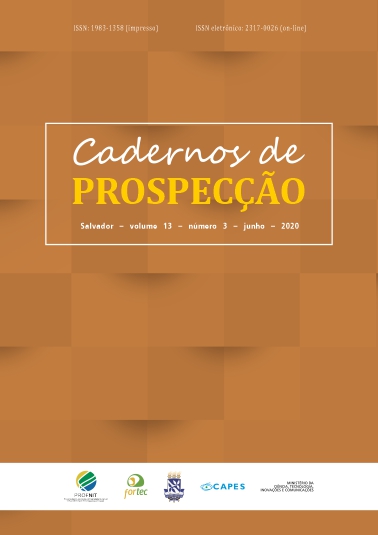Smart Cities: evaluation of the characteristics of the brazilian intelligent cities innovation ecosyste
DOI:
https://doi.org/10.9771/cp.v13i3.32928Keywords:
Smart City, Innovation Environment, Innovation.Abstract
Technological innovations are key enablers for overcoming major urbanization challenges and improving city management and the quality of life of citizens. Thus comes the concept of smart city, which uses information and communication technology (ICT) to improve its livability, work capacity and sustainability and to become intelligent it needs an environment that fosters innovation and generation of information. Business. This study investigates what are the characteristics of the innovation ecosystems of the smartest cities in the world to analyze and the improvement of Brazilian cities. The research was exploratory, the research approach is qualitative and the research design is bibliographic. It was concluded that, after the analysis, the Brazilian cities that currently hold the most mature status in the theme of smart cities obtained much lower results in the innovation ecosystem indicators of the four selected dimensions: economic, governance, human capital and technology.
Downloads
References
CARIONI, L. Por que cidades inteligentes precisam de ecossistemas de inovação? 20 abr. 2018. Disponível em: http://insights.certi.org.br/cidades-inteligentes. Acesso em: 16 jun. 2019.
CARNEIRO, A.; CARVALHO, L. Determinantes da Inovação nas Indústrias Brasileiras: Evidências Empíricas para os Setores de Alimento, Automobilístico e Eletrônico. In: XVI SIMPÓSIO DE ADMINISTRAÇÃO DA PRODUÇÃO, LOGÍSTICA E OPERAÇÕES INTERNACIONAIS, 2013. Anais [...], 2013.
CUNHA, Maria Alexandra. Smart cities [recurso eletrônico]: transformação digital de cidades. Maria Alexandra Cunha, Erico Przeybilovicz, Javiera Fernanda Medina Macaya e Fernando Burgos. São Paulo: Programa Gestão Pública e Cidadania (PGPC), 2016. 161p. ISBN: 978-85-87426-29-11.
EREMIA, M.; TOMA, L.; SANDULEAC, M. The Smart City Concept in the 21st Century. Proceedings of 10th International Conference Interdisciplinarity in Engineering, INTER-ENG. Romania, 2016.
EUROPEAN COMISSION. What is Smart City. [2019]. Disponível em: https://ec.europa.eu/info/eu-regional-and-urban-development/topics/cities-and-urban-development/city-initiatives/smart-cities_en. Acesso em: 16 jun. 2019.
EXAME. Curitiba supera São Paulo em ranking e é cidade mais inteligente do Brasil. [2019]. Disponível em: https://exame.abril.com.br/brasil/curitiba-supera-sao-paulo-em-ranking-e-e-cidade-mais-inteligente-do-brasil/ Acesso em: 16 jun. 2019.
FORBES. The Smartest Cities in The World in 2018. Disponível em: https://www.forbes.com/sites/iese/2018/07/13/the-smartest-cities-in-the-world-in-2018/#3ff44b8c2efc. Acesso em: 16 jun. 2019.
FGV – FUNDAÇÃO GETÚLIO VARGAS. Smart Cities: Transformação Digital de Cidades – Programa Gestão Pública e Cidadania (PGPC). 1. ed. São Paulo: FGV, 2016.
GIL, A. C. Como Elaborar Projetos de Pesquisa. 4. ed. São Paulo: Atlas, 2009.
HOWARD, Edward. Cidades-Jardins de Amanhã. São Paulo: Hucitec, 1996.
IESE BUSINESS SCHOOL. IESE Cities in Motion Index. Navarra, 2019.
IPT – INSTITUTO DE PESQUISA TECNOLÓGICA. Relatório 1 da Bacia do Pardo. São Paulo: IPT, 2006. Disponível em: www.sigrh.sp.gov.br. Acesso em: 17 jun. 2019.
MARCONI, M. A.; LAKATOS, E. M. Fundamentos de Metodologia Científica. 6. ed. São Paulo: Atlas, 2007.
MARTINS, R. A. Sistemas de medição de desempenho: um modelo para estruturação do uso. 1999. 248p. Tese (Doutorado) – Escola Politécnica da Universidade de São Paulo. Departamento de Engenharia de Produção, São Paulo, 1999.
NJ MED – DESENVOLVIMENTO EDUCACIONAL DE MINORIAS DE NOVA JERSEY. (EUA) (org.). Ranking Global Universidades do Projeto Top 20 Mundial: 5º Ranking Global Universidades do Projeto Top 20 Mundial. 2019. Disponível em: https://worldtop20.org/global-universities?gclid=Cj0KCQjw9JzoBRDjARIsAGcdIDWxyMLeeIPnjJpN0TegonPC4BcvsBw7p6_fKEAqU8mE7uiU1aE29h8aArADEALw_wcB. Acesso em: 17 jun. 2019.
PÉREZ, A. D. et al. Network Architecture based on Virtualized Networks for Smart Cities. Guadalaraja, México, 2013.
SCHUMPETER, J. A. Business cycles. New York: McGraw Hill Books, 1939. v. I.
SOARES, D. J. Cidades Inteligentes: um novo arranjo para o desenvolvimento. In: II ENCONTRO DAS FACULDADES DE GESTÃO DE NEGÓCIOS, Uberlândia, 2012. Anais [...], Uberlândia, 2012.
SOUZA, N. J. de. Teoria dos pólos, regiões inteligentes e sistemas regionais de inovação. Análise, Porto Alegre, v. 16, n. 1, p. 87-112, jan.-jul. 2005.
WORLDATLAS (EUA) (org.). Cidades com as Empresas Mais Importantes da Fortune 500: Cidades com a maior quantidade de sedes de empresas de capital aberto. 2019. Disponível em: https://www.worldatlas.com/articles/cities-with-the-most-company-headquarters.html. Acesso em: 17 jun. 2019.
Downloads
Published
How to Cite
Issue
Section
License
Copyright (c) 2020 Cadernos de Prospecção

This work is licensed under a Creative Commons Attribution-NonCommercial 4.0 International License.
O autor declara que: - Todos os autores foram nomeados. - Está submetendo o manuscrito com o consentimento dos outros autores. - Caso o trabalho submetido tiver sido contratado por algum empregador, tem o consentimento do referido empregador. - Os autores estão cientes de que é condição de publicação que os manuscritos submetidos a esta revista não tenham sido publicados anteriormente e não sejam submetidos ou publicados simultaneamente em outro periódico sem prévia autorização do Conselho Editorial. - Os autores concordam que o seu artigo ou parte dele possa ser distribuído e/ou reproduzido por qualquer forma, incluindo traduções, desde que sejam citados de modo completo esta revista e os autores do manuscrito. - Revista Cadernos de Prospecção está licenciado com uma Licença Creative Commons Attribution 4.0. Esta licença permite que outros remixem, adaptem e criem a partir do seu trabalho para fins não comerciais, e embora os novos trabalhos tenham de lhe atribuir o devido crédito e não possam ser usados para fins comerciais, os usuários não têm de licenciar esses trabalhos derivados sob os mesmos termos.
Este obra está licenciado com uma Licença Creative Commons Atribuição 4.0 Internacional.





